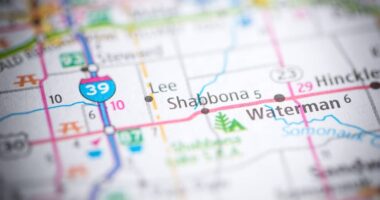
After years of tension, a conflict over land in rural Illinois between Native Americans and locals is reaching a boiling point.
For 173 years, the Prairie Band Potawatomi Nation’s Chief and tribe have been fighting to reclaim the land that was auctioned off.
According to Prairie Band chairperson Joseph ‘Zeke’ Rupnick, the proposed federal bill aims to rectify a longstanding injustice. Rupnick, a descendant of the Chief, mentioned that the tribe has not yet determined the plans for the Potawatomi land in the event that the bill is approved.
The tribe had considered opening casinos, electric bingo halls, and hotels in the past. However, Rupnick believes that gaming in Illinois has become oversaturated due to the easy accessibility of casinos, sportsbooks, and slot machines in bars throughout the state.
While it is true that Illinois is home to many casinos and more are being built, a casino could still serve as a lucrative income stream for the Tribe.
What happened to the land in the first place?
Shabbona, a village located south of DeKalb, is named in honor of Potawatomi Chief Shab-eh-nay. Chief Shab-eh-nay famously embarked on a courageous horseback ride reminiscent of Paul Revere to alert settlers of imminent danger from approaching attackers.
The Chief was rewarded by the United States government in 1829 for his heroism and other contributions in the area, receiving 1,280 acres of land where Shabbona currently resides.
The 1833 Treaty of Chicago, enacted four years later, allowed Native American tribes to cede five million acres of land west of Lake Michigan to the government. This land included the Chief’s territory, known today as Shabbona.
Nevertheless, a federal bill is currently being considered that asserts the Senate did not ratify that specific part of the treaty.
The Treaty of Chicago compelled Potawatomi Nation members, including the Chief, to relocate to Kansas. In 1849, the Chief’s land was auctioned off without his consent while he was residing in Kansas.
Federal bill getting pushback from Shabbona locals
Residents in Shabbona and surrounding areas are upset at the prospect of their land being endangered due to the bill’s ruling. They argue that the land in question was never designated as a reservation.
Instead, they claim that the land was privately owned by the Chief, who tried to sell or abandon it while in Kansas. The primary opponent of the bill is former Illinois House Speaker Dennis Hastert.
The federal bill is not intended to strip land from locals. Instead, it seeks to provide compensation to the Prairie Band for their losses and grant Shabbona landowners clear ownership of their land.
If the federal bill passes through, the language in some village deeds stating ‘all rights, claims, or title to the descendants of Potawatomi Chieftain Shabbona and his Band’ would be removed.
The Potawatomi will receive $10 million in compensation over the next nine years, allowing them to acquire 1,151 acres of land in the Shabbona area.
Deb Haaland, the first Native American US Secretary of the Interior and former US Representative, would be tasked with determining the payment amounts over the course of nine years.
A suggestion was made for the creation of a museum dedicated to Native American heritage, specifically focusing on Potawatomi artifacts. Additionally, plans included the construction of a lodge to accommodate the approximately 500,000 visitors to the nearby state park.
Shabbona Village Board and Potawatomi Tribe have a good relationship
Although facing resistance from Shabbona residents, the village board has remained in favor of the tribe’s proposals. According to Shabbona trustee Marc Cinnamon:
Some villagers question why we are engaging with them, but we are interested in becoming involved if they achieve sovereignty over the nearby land.
The DeKalb County Board has differing opinions. In a recent vote, the board rejected the federal proposal with a 12-10 vote. Chairman John Freiders stated his thoughts on the outcome of the vote.
We are worried about all aspects. Without the necessary information, we are unable to make any decisions.
Federal bill is part of a larger movement across the country
In recent times, there has been a growing trend of occurrences like this as part of the Land Back movement, advocating for the return of land to Indigenous communities who originally owned it. Several federal judges have ruled in favor of the tribes in these cases.
Doug Kiel, a member of the Oneida Nation and a professor at Northwestern University, expressed his thoughts on Native Americans seeking compensation for the land that was unjustly taken from them.
“This is becoming more and more likely to be the path of the future. What may appear as irrelevant history actually holds significant implications for the present.”
Local governments are concerned about the destination of property tax revenue due to the exemption of Indian reservations from taxes.
However, Kiel mentioned that compensation is open to negotiation. This situation parallels the Potawatomi’s decision to return land to the US in the past.




